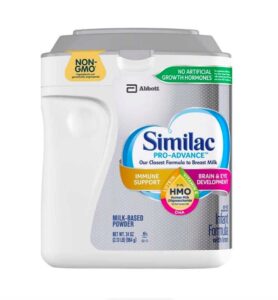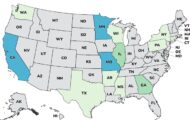Abbott Nutrition’s recall of powdered infant formula includes Similac products made at the company’s facility in Sturgis, MI over the 15-month period from November 1, 2020, to February 17, 2022, according to recall information the company provided to retailers.
Because these dates are not mentioned in the company’s public recall announcement, consumers may not be aware that formula they purchased for their infants more than a year ago is part of this recall. The length of the production window associated with the recall also raises questions about the results of the FDA’s inspection of the plant.
Abbott issued a recall for Similac, Alimentum, EleCare, and EleCare Jr on February 17, 2022, after the U.S. Food and Drug Administration (FDA) announced an investigation of Cronobacter and Salmonella illnesses among infants who had consumed these products. On February 28, 2022, Abbott expanded the recall to include one lot of a specialty formula called Similac PM 60/40, the lot code is 27032K800.
All of the recalled products have the following information on the bottom of the can:
- The first two digits of the code are 22 through 37
- The code on the container contains K8, SH, or Z2,
- The expiration date is 4-1-2022 (APR 2022) or later
As of February 28, 2022, the investigation includes five illnesses from three states and two fatalities in Ohio. The infants who developed these infections consumed Similac Sensitive, Similac Pro-total Comfort, Similac Advance, and Similac PM 60/40 before they became ill, according to the Centers for Disease Control and Prevention (CDC).

Four of the infants developed Cronobacter sakazakii infections, one of them was diagnosed with a SalmonellaNewport infection. All five infants, who became ill between September 6, 2021, and January 4, 2022, were hospitalized. The number of illnesses reported from each state is: MN (1), OH (2), TX (2).
Cronobacter bacteria live on dry foods such as herbal tea, powdered milk, and infant formula. Illnesses are rare but are known to cause serious illness, such as sepsis and meningitis, in newborns. Often these infections are fatal.
During an inspection of Abbott’s Sturgis facility, the FDA collected environmental samples. Several of these, taken from non-product contact areas, were positive for Cronobacer. The agency noted other “adverse inspectional observations” and discovered through a review of the company’s records that product had previously been destroyed due to the presence of Cronobacter.
One week before the recall, on February 10, 2022, the FDA notified the CDC that it was investigating illnesses related to powdered infant formula produced at Abbott’s plant in Sturgis. Days later, the CDC asked state health and local health departments for information on any cases of Cronobacter “associated with infant formula from November 2020 through the present.”
That window for reports of possible illness in the CDC’s request mirrors the previously undisclosed production dates associated with this recall. This suggests that the FDA found something during its inspection that makes November 2020 significant.





